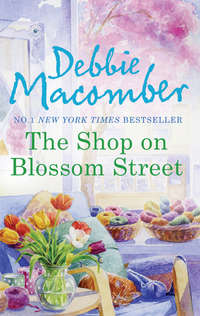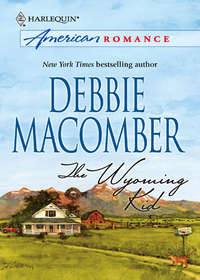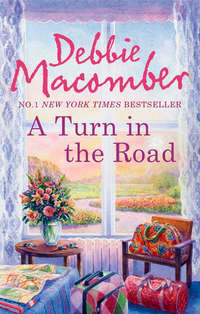
Полная версия
Cedar Cove Collection
Troy had left everything in the house exactly the way it was the day he’d taken her to the nursing home. In the beginning that seemed important to Sandy. It was to him, too. It helped perpetuate the pretense that she’d recover. She’d needed to believe it, until she no longer could, and he’d wanted to hold on to the slightest shred of hope.
“I’m not sure what to do with all of Mom’s clothes.” Megan stood in the middle of the bedroom, her arms hanging limply at her sides. Sandy’s half of the walk-in closet was bare.
“I had no idea Mom had so many clothes,” Megan said helplessly. “Should we donate them to charity?”
Troy wished now that he’d asked Pastor Flemming about that. Perhaps the church had a program that collected items for the poor.
“We should.” Still, if it was up to him, he wouldn’t change a thing. Or at least not for a while … He didn’t understand why Megan thought it was important to pack up the remnants of her mother’s life so soon. When she’d arrived with the cardboard boxes, Troy hadn’t argued, but frankly, he didn’t see the necessity of rushing into this.
“Most of them are outdated now.” Megan held up a pink sweater, one Sandy had always loved.
“Leave everything here for now,” he suggested.
“No.” The vehemence with which his daughter responded surprised Troy.
“Megan, let’s not do something we might regret later.”
“No,” she said again, shaking her head. “Mom’s gone. She’ll never hold her grandchildren. She’ll never go shopping with me again. She’ll never share a recipe with me. She’ll … she’ll …” Tears rained down her pale cheeks.
Troy felt utterly incapable of easing her grief. He’d never been good at dealing with emotions and was at an even greater loss now. Megan was an only child and she’d been close to her mother. Both Sandy and Troy had wanted more children. For years, they’d tried for a second child, until after the third miscarriage, when Troy had said enough. They should be grateful they had a beautiful daughter, he’d told her, instead of yearning for a larger family.
“It’s only been two months,” he reminded Megan as gently as possible.
“No, Dad,” she said. “It’s been a lot longer than that.”
Troy understood this far better than Megan seemed to realize. In the end, Sandy barely resembled the woman he’d married. Her death, while tragic, was a release from the physical nightmare that had become her reality. Sandy had lived with MS for at least thirty years. Not until after she miscarried the third pregnancy had she been tested. Then, and only then, were the physicians able to put a name to the seemingly random symptoms she’d been experiencing for years. Multiple sclerosis.
“Let’s not donate anything just yet,” Troy said.
“Mom’s gone,” Megan repeated in the same emotionally charged tone. “We both have to accept it.”
Troy didn’t have any choice but to accept the fact that his wife was dead. He wanted to tell Megan that he was well aware Sandy was gone. He was the one who walked into an empty house every night, the one who slept alone in a big bed.
Ninety per cent of his free time had been spent at the nursing home with Sandy. Now he was bereft and at loose ends. He knew he’d never be the same. Like him, Megan was hurting and she needed to vent her grief, so he said nothing.
“I’ll help you pack everything up and I’ll put the boxes in the basement,” he murmured. “When you’re ready … when we both are, I’ll bring them upstairs again. Then, and only then, should we think about donating your mother’s things to charity. If we decide to do it, I’ll ask Pastor Flemming to suggest an agency. There might even be one at the church.” If not, he’d go to St. Vincent de Paul or the Salvation Army, both organizations Sandy had supported.
For a moment it looked as if Megan wanted to argue with him.
“Agreed?” he pressed.
His daughter reluctantly nodded. Glancing at her watch, she gnawed on her lower lip. That told him how close she was to breaking down. “Craig will be home any minute. I should leave.”
“Go.” He gestured toward the door.
His daughter hesitated. “But the bedroom’s a mess.”
“I’ll take care of it.”
She shook her head. “That’s unfair, Dad. I … I didn’t mean for you to have to deal with all this.”
“All I’m going to do is fold everything, put it inside these boxes and haul them downstairs.”
“You’re sure?” she asked uncertainly.
He nodded. The truth was, Troy would rather be alone right now.
She edged her way into the living room and toward the front door. “I hate leaving you with this….”
“Don’t worry about it.” He was more than capable of packing away a few boxes of clothes.
Megan reached slowly for her purse. “You’ve thought about dinner?”
So far he hadn’t. “I’ll open a can of chili.”
“Promise?”
“Of course.” Not that skipping dinner would do him any harm. Troy figured he could easily afford to lose twenty pounds. Most of that extra weight had snuck up on him after he’d moved Sandy to the nursing home. Meals became haphazard after that. He’d fallen victim to the fast-food chains; there weren’t many in Cedar Cove, but the few that had opened in town he knew well. Because of his job and its demands on his time, he often missed breakfast and sometimes even lunch. Then he’d arrive home ravenous late in the evening and he’d eat whatever was quick and easy, which usually meant high-calorie processed food. He couldn’t remember the last time he’d actually made a green salad or eaten fresh fruit.
With Sandy gone, he’d lost his emotional balance. Troy felt a sense of emptiness, a gap where his love for Sandy used to be. He still loved her, of course, but the duties and responsibilities attached to that love had disappeared. They’d represented a big part of his life in the last few years.
Sandy dead at fifty-seven—it wasn’t supposed to happen like this. He should’ve been the one to die first; he was the one in a dangerous profession. Practically every day someone in law enforcement was killed in the line of duty. He should’ve died before his wife did. That was what all the statistics predicted. Then Sandy would’ve been able to live comfortably on his pension for another ten or twenty years. Instead, his wife was gone and he was floundering.
“I’ll give you a call later,” his daughter said as she walked to the front door.
“Okay.” Troy stood on the porch and watched her pull out of the driveway. He felt so drained, it took an inordinate amount of energy to step back and close the door.
The house had never seemed quieter. Standing by the threshold, he was astonished by the total lack of sound. Silence reverberated around him. Generally he turned on the radio for company, or if he was desperate, the television. But tonight, even that seemed to require more ambition than he could muster.
As he went back into the bedroom with Sandy’s clothes strewn about, Grace Sherman drifted into his mind. Grace Harding now, since she’d married Cliff.
Funny that he’d think about one of his high-school friends at a time like this. And yet, it made sense. What came to mind was an incident shortly after Dan’s disappearance. Hard to believe that had been six years ago. Dan Sherman was found dead a year later.
Troy never knew exactly what had driven the other man into his own private hell. He wasn’t sure he wanted to know either, although he suspected it had something to do with Dan’s experience in Vietnam. The war had left Dan permanently damaged in some way. Not in body but in mind, in spirit. He’d become reclusive, unfriendly, refusing to share his memories and fears even with other Vietnam vets like Bob Beldon.
When Dan disappeared, Troy had taken the missing-persons report. Several months later, he’d been called by a neighbor, who was concerned about Grace. In her pain and anger, she’d tossed Dan’s clothing onto the front yard of their home on Rosewood Lane.
Now, standing in his own room surrounded by Sandy’s things, Troy remembered the sight of Dan’s clothes scattered on the grass—and he understood the powerful emotions that had led Grace to explode in such an uncharacteristic display. A part of him didn’t want to deal with the residual effects of Sandy’s life. Just limping from one day to the next was painful enough.
His gaze fell on the pink sweater Megan had so recently shown him. He picked it up and buried his nose in the soft wool. There was still a hint of his wife’s favorite perfume and he breathed it in, deeply, greedily. She’d worn this sweater at Easter last year. Troy had pushed her wheelchair to the open-air church services overlooking the cove. Sandy had always been a morning person, even toward the end. He used to tease her that she’d been born with a happy gene.
Her smile was one of the things he’d loved most about her. No matter how much he growled or muttered in the mornings, she’d respond cheerfully, often making him laugh. He closed his eyes as the pain cut through him. Never again would he see Sandy’s smile or hear her joyful voice.
With a heavy heart, he carefully folded the pink sweater and placed it inside the box. He wasn’t ready to see someone else wearing his wife’s clothes. Since they lived in a small town, it was bound to happen sooner or later. Most likely when he was least expecting it or least prepared to deal with it. Troy would turn a corner and run into another woman wearing Sandy’s favorite dress. He didn’t know how he’d react to that. The mere thought twisted his gut.
The phone rang in the distance, and for half a second he was tempted just to let the caller leave a message—or not. But too many years as a cop had made it impossible to ignore a ringing phone.
To Troy’s surprise it was his daughter.
“Dad,” she said, “you’re right. Keep Mom’s things for now. Keep everything.”
Troy could tell Megan had been crying.
“Okay,” he said. “Okay, Meggie.”
“If you want, I’ll come back tomorrow and finish packing it all up.”
“I’ll do it,” he said. Hard as that would be, he was better able to deal with this one last task than his daughter. Megan’s composure had shattered, while he moved through his days in a state of numbness that masked the pain.
Three
Barbecued chicken, a green salad, garlic bread—a perfect dinner for a perfect summer day. With mixed berries and ice cream for dessert. Justine Gunderson enjoyed making her leisurely preparations for tonight’s meal.
She pulled the covered bowl of chicken breasts out of the refrigerator. She flipped them in their soy-and-honey marinade, then set the container back inside. Like many of her favorite recipes, this one had come from her grandmother, Charlotte Jefferson Rhodes.
Leif, her almost-five-year-old son, was playing in the backyard with his dog. Penny, a cocker spaniel-poodle mix, chased after the boy, barking excitedly. The pure joy of the moment made Justine smile as she stepped through the patio doors. Seth would be home soon and he’d barbecue the chicken while she put the finishing touches on the salad. Leif would start setting the outdoor table, since he loved arranging the napkins and colorful place mats.
As this little domestic scene played out in her mind, she felt a sense of tranquility. Even now, all these months after the fire that had destroyed their restaurant, Justine was unaccustomed to the three of them having an uninterrupted evening together.
So much of her life—their lives—had been consumed by The Lighthouse. The restaurant had completely absorbed their time and energy. Until the fire, Justine and Seth rarely saw each other. Everything was always done in a rush as they divided the duties involved in running the restaurant, taking care of the house and, most important of all, raising their son. Thankfully, they’d reached a compromise concerning the new restaurant they planned to open.
“Mommy, look!” Leif shouted, throwing a stick for Penny.
The dog instantly leaped forward, racing after the stick. She picked it up, then crouched a few feet away, tail wagging frantically, and challenged the boy to grab the stick.
“Penny, bring it to Leif,” Justine called out.
“She’s as stubborn as every other female in this house,” Seth said from behind Justine. “Well, the only other female.” He slid his arms around her waist and kissed the side of her neck. Leaning into her husband, Justine tucked her hands around his and closed her eyes, reveling in the moment.
“I didn’t hear you come in,” she said.
“Daddy, Daddy!” Leif shouted, dashing across the freshly cut lawn.
Seth scooped his son into his arms and lifted him high over his head. “I see you’re training Penny to play catch.”
“She won’t give me the stick.”
“She’ll learn,” Seth told him. “Come on, we’ll both work with her.”
While Seth and Leif played with Penny, Justine went into the house to pour her husband a cold drink. The doorbell rang; abandoning the glass of iced tea, Justine hurried to answer it.
Her grandmother stood there, clutching the huge purse Leif called her “granny bag.” Among other things, it contained her current knitting project, a roll of mints, a comb and a notebook—but no cellphone or credit cards. Delighted to see her, Justine threw both arms around Charlotte in a tight hug.
“I hope you don’t mind me coming by like this,” Charlotte said as Justine led her into the house. “I was in the neighborhood—well, relatively speaking. Olivia said you wanted to talk to me.”
“Grandma, you’re welcome anytime, you know that!”
“Well, normally I wouldn’t stop in without warning, but I was chatting with your mother this afternoon and she said you wanted to ask me about recipes.”
“I do.” Justine slipped her hand in Charlotte’s and they moved into the kitchen.
“I was just getting Seth a glass of iced tea,” Justine said. “Can I get one for you, too?”
“Please.” Charlotte set her large bag on an empty chair and sat down. These days, it was unusual to find her without Ben, her husband of three years.
As if reading her thoughts, Charlotte explained. “An old friend of Ben’s is visiting from out of town. I stayed long enough to meet Ralph, then made my excuses. All that talk about navy life is too much for me.” She pulled her knitting out of the bag and resumed the sweater she was working on. Her grandmother didn’t believe in idle hands.
Justine brought two glasses of tea and sat across from her.
“Now, what can I do for you?” Charlotte asked. “You need recipes for the tearoom?”
“Yes.” Justine rested both elbows on the table. “I’ve been doing a lot of thinking about it,” she said. Although the building process hadn’t yet begun, she had a clear vision of the kind of restaurant she wanted. The menu had to be exactly right, and Justine couldn’t think of anyone better to consult than her own grandmother.
“It’s a good idea to plan ahead.” Charlotte paused in her knitting to look at Justine. “Olivia told me you’re going to serve breakfast, lunch and a high tea, then close in the evenings.”
Justine nodded. “Seth and I decided we’d rather have our evenings together. Leif’s flourished in the last few months with both of us home.” The arson that had destroyed The Lighthouse had eventually—and unexpectedly—turned out to be a blessing in a very nasty disguise. She was grateful no one had been hurt or worse. And grateful that this crime had changed their lives in a positive way.
“You’re wise to put your family first.”
Justine suspected her marriage wouldn’t have survived another year at the rate they’d been going. She glanced out at the yard, where Seth frolicked with their son and Penny.
“You said you talked to Mom. Were you at the courthouse today?” Her grandmother liked to watch Justine’s mother at work. Charlotte sat proudly in Olivia’s courtroom and knitted away, although her visits had become less frequent now that she’d married Ben.
“Actually I ran into her this morning while I was in town. She was on her way to a doctor’s appointment.”
Justine tensed. She didn’t remember her mother mentioning that, and they spoke nearly every day. “Oh.”
“It’s nothing serious,” Charlotte said quickly. “Just a routine visit, she told me. For her mammogram.”
“Oh, good.” Justine relaxed in her chair, crossed her legs and picked up her own glass of iced tea. “I’d like some of your recipes, Grandma,” she began.
“Any in particular?” Charlotte’s fingers manipulated the needles and yarn with familiar ease.
“I was hoping to get the recipe you have for scones.” They were a long-time family favorite and Charlotte baked them for nearly every family function.
Charlotte seemed pleased. “The herb-and-cheese scones are the ones I like best.”
“Me, too.”
Her grandmother paused reflectively. “My mother used to make those scones, so that recipe actually came from her. I have a couple of other scone recipes I’ll write out for you, as well,” she added. “Clyde’s favorite was a walnut-and-butter scone. Ben prefers the herb-and-cheese.”
“Thanks,” Justine said. “But I’d be happy to copy them out myself if—” It suddenly occurred to her that her grandmother might have all these family recipes in her head, that she might never have written them down before.
“I’ll bring them to you tomorrow morning,” Charlotte went on. “In fact, you’re welcome to all my recipes, dear. Just tell me which ones you want.”
“Grandma,” Justine said, broaching the subject carefully. “You do have your recipes written down somewhere, don’t you?”
Charlotte laughed. “Good grief, no.”
“No!”
“I’ve been cooking for over seventy years. The recipes were taught to me by my mother and, well, I never thought it was necessary. I certainly wasn’t going to forget them.”
“What about the raspberry vinaigrette salad dressing?”
“Oh, that one,” Charlotte said with a sigh. “I got it from a newspaper article around 1959. I’ve changed it through the years.”
“Grandma, would you write them out for me? All of them?”
“Of course.” Her knitting needles made soft clicking sounds as she continued to knit. “Actually, that’s an excellent suggestion, Justine. I’m sure Ben will approve, too. He always says I should publish a cookbook, you know. He loves my peanut butter cookies.” She preened just a little.
“And your cinnamon rolls.”
“I think that man married me for my baking.”
Justine laughed at the absurdity of her comment. One look at Ben Rhodes, and anyone could see that he was crazy about Charlotte.
“Now tell me more about the tearoom,” Charlotte said conversationally.
Justine smiled. “Well, there’s been a change in plans.”
“Oh?” Her grandmother stopped knitting for a moment.
Justine uncrossed her legs and leaned forward. “Seth and I couldn’t tell anyone until all the details were settled. The builder, Al Finch, contacted us a few weeks ago and asked if we’d be willing to sell the property. He said he might have a buyer.”
Silence followed her statement. “I thought you and Seth weren’t interested in doing that.”
“We weren’t, especially if it meant that a fast-food franchise would be built on the waterfront. But this is the best part, Grandma. The man who inquired about the land, Brian Johnson, is a friend of Al’s. He’s owned a number of restaurants through the years. He retired but got bored. Seth and I met with him and we were both impressed. Brian said he’d like to rebuild The Lighthouse the way it was. He even wants to keep the name.”
“But that was your restaurant,” her grandmother protested.
“True, but he’s willing to pay us for the name and everything.”
Her grandmother paused again, as if she needed time to absorb the news. “Are you going to do it? And what about the tearoom? Where will you build that?”
Justine explained that Al Finch had shown them a piece of commercial property off Heron that he owned and was planning to sell. The location was perfect for The Victorian Tea Room. “We signed the papers earlier this week.”
There was another moment of silence.
“You aren’t disappointed in us, are you, Grandma?”
“No,” her grandmother assured her. “I think this is wonderful news.”
So did Justine. All the hard work they’d put into The Lighthouse wouldn’t go to waste now. Seth had given the new owner his suggestions on how to rebuild the restaurant, and now that she was no longer involved, she looked forward to seeing it emerge from the ashes.
“It’s happened so fast.”
“It has,” Justine agreed, “but it feels right. This new location is much better for the tearoom and there’s more parking. I can’t believe how all of this practically fell into our laps.”
“I’m pleased for both of you,” her grandmother said.
“I am, too.” Justine gazed longingly into the backyard. Seeing Seth with Leif brought her a feeling of contentment, of satisfaction. This was what she’d always wanted, what she’d hoped for in her marriage.
“I should get home,” Charlotte said. “Ben’s probably wondering what’s keeping me.” She finished her iced tea, put her knitting back in her bag and stood up.
“It’s wonderful to see you, Grandma.”
“You, too, sweetheart.” She kissed Justine’s cheek. “I’ll start writing down those recipes. I’ll do my best to remember them all, so if I forget any, let me know.” She frowned. “I’d better go through the ones I cut out from magazines, too. And the ones I was given at wakes.”
“Isn’t that where you got your fabulous coconut cake recipe? At a wake?”
“Yes—Mabel Austin’s. Back in ’84.”
Justine grinned at this, but she supposed that a great recipe wasn’t the worst memorial someone could have.
“I’ll just step outside and say hello to Seth and Leif,” Charlotte murmured as she carried her empty glass to the sink. “My goodness, that young man is growing. I don’t remember him being nearly that tall.”
“Seth or Leif?” Justine asked with a laugh. It was true; Leif was tall for his age, but then his father was a big man.
“Leif, of course,” her grandmother said, obviously missing the joke.
“By the way …” Justine opened the patio door. “We’re barbecuing chicken tonight and I’m using a recipe I got from you.”
“The one with soy sauce and honey? I picked that up at a wake, too.”
Justine couldn’t hold back a smile. “Whose wake? Do you remember?”
“Of course I do,” she answered in a dignified voice. “Norman Schultz. 1992. Or was it ’93?” With that Charlotte walked outside.
Penny and Leif ran toward her. Knowing he needed to be gentle with his great-grandmother, Leif pulled up short and then stood still, giving Charlotte the opportunity to hug him. Penny, however, felt no such constraint. With one sharp command, Seth controlled the dog, who promptly sat. After she’d finished chatting with Leif, Charlotte leaned over to stroke Penny’s fur. She gave Justine a final wave, then Seth walked her out to her car.
When he returned to the kitchen, he asked, “Is that for me?” motioning toward the glass of iced tea on the counter.
“Oh, sorry,” Justine said. “I was about to bring it to you when my grandmother arrived.” She removed an ice-cube tray from the freezer. “Here. I’ll add some ice.”
“Thanks,” he said, pausing to take a long drink of the tea. “Did you tell her we sold the property?”
“I did.”
“What did she think?”
Justine grinned. “That we’re too brilliant for words.”
Seth took another swallow of the tea. The ice cubes tinkled cheerfully as he set the glass down. “Your mother and Jack know, don’t they?”
“I told her this morning. Speaking of which …” Justine grew thoughtful.
“Yes?” Seth urged.
“She didn’t say she had a doctor’s appointment.”
“So? Should she have?”
“No, I guess not, but it makes me wonder….” She suspected there was a reason her mother didn’t want her to know about the appointment, and that concerned Justine. Charlotte might have said it was “routine,” but was Olivia expecting bad news?








